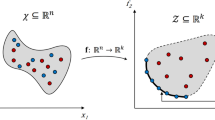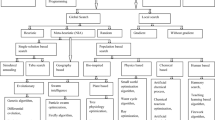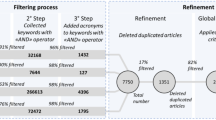Abstract
This paper presents bi-criteria formulation of a tolerance allocation model for an interchangeable assembly to simultaneously evolve suitable combination of manufacturing facility in multiple facility shaft-hole production environments of medium- and large-scale industries and tolerances to complement the need of customers. An Exhaustive Search Procedure is used to obtain the optimal solution for small and medium size problems and simulated annealing algorithm is used for large size problems. The usefulness of the Pareto front in manufacturing tolerance allocation decisions is demonstrated with three case study problems. The effect of process capability of shaft-hole assembly manufactured from alternative manufacturing machines and the optimality is analyzed in three cases to understand their criticality in decision-making. The models discussed in this paper could be useful for medium- and large-scale manufacturing industries, where there will be a variety of manufacturing facilities (specifications, capabilities, models, and types) for making both shaft-hole assembly and play a key role to meet the tolerance and cost requirements of different customers. This paper further discusses how this formulation and methodologies can be used for two hole and two shaft assemblies and multiple shaft-hole assemblies. Finally, the paper ends with highlighting directions of future research avenues in the shaft-hole assembly.
Similar content being viewed by others
References
Lee CL, Tang GR (2000) Tolerance design for products with correlated characteristics. J Mech Mach Theory 35:1675–1687
Zhang C, Wang HP (1993) Integrated tolerance optimization with simulated annealing. Int J Advd Manuf Technol 8:167–174
Choi HG, Park MH, Salisbury E (2000) Optimal tolerance allocation with loss functions. J Manuf Sci Eng 122:529–535
Prabhaharan G, Asokan P, Rajendran S (2005) Sensitivity-based conceptual design and tolerance allocation using the continuous ants colony algorithm (CACO). Int J Advd Manuf Technol 25(5– 6):516–526
Speckhart FH (1972) Calculation of tolerance based on a minimum cost approach. J Eng Ind 447–453
Spotts MF (1973) Allocation of tolerances to minimize cost of assembly. J Eng Ind 762–764
Chase KW, Greenwood WH, Loosli BG, Hauglund LF (1990) Least cost tolerance allocation for mechanical assemblies with automated process selection. Mfg Rev 3(1):49–59
Chen TC, Fischer GW (2000) A GA-based search method for the tolerance allocation problem. Artifintell Eng 14:133–141
Ganesan K, Suresh RK, Mohanram PV, Vishnukumar CH (2001) Optimum tolerance allocation and process allocation using simulated annealing. 4th Conf on MechEng VI: 201–205
Singh PK, Jain PK, Jain SC (2004) A genetic algorithm based solution to optimum tolerance synthesis of mechanical assemblies with alternate manufacturing processes-benchmarking with the exhaustive search method using the Lagrange multiplier. Proc I Mech E Part B: J Eng Manuf 218(B7):765–778
Evans DH (1958) Optimum tolerance assignment to yield minimum manufacturing cost. The Bell Sys Tech J 461–484
Asha A, Kannan SM, Jeyabalan V (2008) Optimization of clearance variation in selective assembly for components with multiple characteristics. Int J Advd Manuf Technol 38:1026–1044
Jeevanantham AK, Kannan SM (2013) Selective assembly to minimize clearance variation in complex assemblies using fuzzy evolutionary programming method. APRN J Eng Appl Sci 8(4):280–288
Cheng KM, Tsai JC (2011) Optimum statistical tolerance allocation of assemblies for minimum manufacturing cost. Appl Mech Matl 52-54:1818–1823
Ye B, Salustri FA (2003) Simultaneous tolerance synthesis for manufacturing and quality. Res Eng Des, Springer-Verlag 14(2):98–106
Rao YS, Rao CS P (2008) A genetic algorithm approach for simultaneous tolerance synthesis for manufacturing and quality with different stack-up conditions. Int j Appl Eng Res 3(9). ISSN: 0973-4562
Kumar RS, Alagumurthi N, Ramesh R (2009) Optimization of design tolerance and asymmetric quality loss cost using pattern search algorithm. Int J Phys Sci 11:629–636
Muthu P, Dhanalakshmi K, Sankaranarayanasamy K (2009) Optimal tolerance design of assembly for minimum quality loss and manufacturing cost using metaheuristic algorithms. Int j Advd Manuf Technoll 44(11):1154–1164
Singh PK, Jain PK, Jain SC (2009) Important issues in tolerance design of mechanical assemblies. Part 2: tolerance synthesis. Proc I Mech E, Part B: J Eng Manuf 223:1249–1286
Sivakumar K, Balamurugan C, Ramabalan S (2011) Simultaneous optimal selection of design and manufacturing tolerances with alternative manufacturing process selection. Comput Aided Des 43:207–218
Jawahar N, Sivasankaran R, Ramesh M (2015) Optimal Pareto front for manufacturing tolerance allocation model. Proc I Mech E, Part B: J Eng Manuf. https://doi.org/10.1177/0954405415586548
Swift KG, Raines M, Booker JD (1999) Tolerance optimization in assembly stacks 22 based on capable design. Proc I Mech E, Part B: J Eng Manuf 213:677–692
Delenay KD, Phelan P (2009) Design improvement using process capability data. J Mater Process Technol 209:619–624
Luna F, Nebro AJ, Alba E (2004) A globus-based distributed enumerative search algorithm for multi-objective optimization. Technical Report LCC 2004/02, 2004
Bai G, Zhang C, Wang B (2000) Optimization of machining datum selection and machining tolerance allocation with genetic algorithms. Int J Prod Res 38(6):1407–1424
Ming X, Mak KL (2001) Intelligent approaches to tolerance allocation and manufacturing operation selection in process planning. J Mater Process Technol 117:75–83
Geetha K, Ravindran D, Sivakumar M, Islam MN (2015) Concurrent tolerance allocation and scheduling for complex assemblies. J Robot CimInt Manuf 35:84–95
Kumar LR, Padmanaban KP, Balamurugan C (2016) Optimal tolerance allocation in complex assemblies using evolutionary algorithms. Int J Simulated Model 15:121–132
Kannan SM, Sivasubramanian R, Jeyabalan V (2009) Particle swarm optimization for minimizing assembly variation in selective assembly. Int j Advd Manuf Technol 42:793–803
Cagan J, Kurfess TR (1991) Optimal design for tolerance and manufacturing allocation. University Libraries, Carnegie Meildn University Pittsburgh.
Duh JD, Brown DJ (2007) Knowledge-informed Pareto simulated annealing for multi-objective spatial allocation. Int j Comput Environ Urban Syst 31:253–281
Bandyopadhyay S, Saha S, MaulikU DK (2008) A simulated annealing-based multiobjective optimization algorithm: AMOSA. IEEE Trans Evol Comput 12(3):269–283
Kamboj MS, Sengupta J (2009) Comparative analysis of simulated annealing and Tabu search channel allocation algorithms. Int J Comp Theory Eng 1(5):1793–8201
ASME (2009) 14.5, Dimensioning and tolerancing. American Society of Mechanical Engineers, New York
Armillotta A (2013) A method for computer-aided specification of geometric tolerances. Comput Aided Des 45:1604–1616
Cho N, Tu JF (2002) Quantitative circularity tolerance analysis and design for 2D precision assemblies. Int J Mach Tools Manuf 42:1391–1401
Acknowledgements
The authors thank the editors and reviewers for their valuable suggestions to improve our research.
Author information
Authors and Affiliations
Corresponding author
Rights and permissions
About this article
Cite this article
Natarajan, J., Sivasankaran, R. & Kanagaraj, G. Bi-objective optimization for tolerance allocation in an interchangeable assembly under diverse manufacturing environment. Int J Adv Manuf Technol 95, 1571–1595 (2018). https://doi.org/10.1007/s00170-017-1232-y
Received:
Accepted:
Published:
Issue Date:
DOI: https://doi.org/10.1007/s00170-017-1232-y




